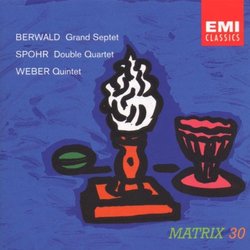| All Artists: Berwald, Spohr, Weber, De Peyer, Melos Ens Title: Music for Wind Ensemble Members Wishing: 0 Total Copies: 0 Label: EMI Classics Imports Original Release Date: 1/1/1967 Re-Release Date: 4/3/2001 Genre: Classical Styles: Chamber Music, Historical Periods, Classical (c.1770-1830) Number of Discs: 1 SwapaCD Credits: 1 UPC: 724356599529 |
Search - Berwald, Spohr, Weber :: Music for Wind Ensemble
CD Details |
CD ReviewsA fine collection of chamber music from the early Romantic e Discophage | France | 12/16/2006 (4 out of 5 stars) "The Melos Ensemble of London - not to be confused with the German Melos (String) Quartet of Stuttgart - was a group of twelve core musicians (string & wind quintet, piano and harp), formed in 1950 around founding members and mainstays violist Cecil Aronowitz and clarinettist Gervase de Peyer. They established a reputation as a leading chamber ensemble, a kind of British equivalent to the Vienna Octet - taking part in the first performance of Britten's War Requiem in 1962 (Britten: War Requiem) and making numerous recordings for labels such as Decca and EMI, both of classic to romantic repertoire and of contemporary music. They disbanded in 1973, but served as a model to the more recent and still active Chamber music groups such as the Nash Ensemble or the Academy of Saint-Martin-in-the-Fields Chamber Ensemble.
EMI have reissued the recordings made for them by the Melos Ensemble in the `60s on various collections, which have come and gone. A pairing of their Mozart and Brahms clarinet quintets, and their Schubert Octet (coupled with the Adagio and rondo concertante) appeared on the mid-price "Studio" collection (and the former can still be found on this site as Clarinet Quintets), and EMI Forte has made and maintained available two twofers with, as main dishes, respectively, Beeethoven's Septet and the Octets of Schubert (shorn of the Adagio and rondo concertante) and Mendelssohn for one (Beethoven: Septet & Octet - Mendelssohn & Schubert: Octets - Melos Ensemble of London or Beethoven: Septet In E/Octet In E/Mendelssohn: Octet In E/Schubert: Ocete In F), and Brahms' clarinet quintet plus the piano quintets of Beethoven and Mozart (but without the latter's clarinet quintet) for the other ( Mozart, Beethoven, Schumann, Brahms: Chamber Music), plus one more containing a collection of 20th century music (Bartok's contrasts, Ravel's Introduction & Allegro, Poulenc, Khatchaturian, Françaix, Skalkottas), now apparently gone and difficult to find at reasonable prices (Bartok, Francaix, Khachaturian, Poulenc and others: Chamber Music). Strangely and regrettably, their Schubert "Trout" (which on the original LP came with the adagio and rondo concertante, with pianist Lamar Crawson) and Mozart clarinet trio (which completed the clarinet quintet on the original issue) have so far been left aside by CD reissue. EMI Matrix was an interesting collection, devoted to reissues of off-the-beaten track repertoire, and lamentably short-lived. Berwald, Nielsen and Szymanowski shared this not abudant collection (it didn't go further than 30 items, apparently) with Lutoslawski and Penderecki. Two CDs of the Melos Ensemble were included: one with Nielsen's wind quintet and Janacek's Mladi and Concertino for piano and winds (n° 12, Nielsen: Quintet Op43; Janacek: In the Mists No1-4) and this one, n° 30, devoted to Berwald, Spohr and Weber's famous clarinet quintet. Berwald's "Grand Septet" of 1828 (paired with Nielsen's quintet on the original LP) closely follows its Beethovenian model, and at its best (middle section of the 2nd movement, finale) is reminiscent of Schubert's Octet - another masterpiece inspired by Beethoven's early composition. Spohr's first double quartet from 1823 (he wrote four), originally and appositely paired with Mendelssohn's Octet, is one of its composer's essays in original instrumental combinations (it's not called an "Octet", and the two quartets are treated as two antiphonally positioned units). The jagged theme that forms the basis of its first movement bears a striking resemblance with the theme of the introductory movement of Haydn's 7 Last Words of Christ on the Cross, and the slow movement has a quasi-Brahmsian sweep to it. The Melos' recording of Weber's infectiously Rossinian clarinet quintet, originally paired with Schumann's Fantasiestücke and Märchenerzählungen op. 132 (now on the Brahms-Mozart-Beethoven twofer mentioned above), is the ensemble's second essay (the first was made in 1959 for Decca and has also been reissued on CD: Hummel: Septet, Op.74, Quintet, Op.87; Weber: Clarinet Quintet, Op. 34 [Australia] or Hummel: Septet op. 74, Quintet op. 87; Weber: Grand Quintetto op. 34). I did some comparative listening of the piece a few years back (still on LP back then) and my conclusion was that Gervase de Peyer and the Melos Ensemble's was an excellent reading. Except for the Weber, the rest is not mainstream repertoire and I do not have the scores nor have done any comparative listening, so I will make no pronouncement on the interpretations, other than saying that the music makes for an agreeable listening, and that whenever I have indeed done close comparative listening (Brahms and Mozart clarinet quintets, Schubert's octet) I have found that the interpretations of the Melos Ensemble were always sonically impressive, intepretively generally on the slow and meditative side, but very dependable at the worst and great at the best. " |

